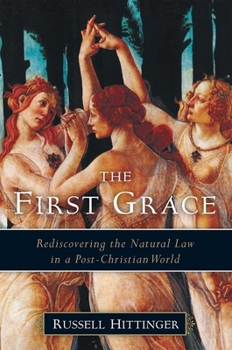The First Grace: Rediscovering the Natural Law in a Post-Christian World
Select Format
Select Condition 
Book Overview
The last two decades or so have seen a marked resurgence of interest in natural law thought, a movement in which Russell Hittinger has been a major figure. The First Grace: Rediscovering the Natural Law in a Post-Christian World reveals the power and subtlety of Hittinger's philosophical work and cultural criticism. Whether discussing the nature of liberalism, the constitutional and moral problems posed by judicial usurpation, or the dangers of technology, Hittinger convincingly demonstrates that in our post-Christian world it is more crucial than ever that we recover older, wiser notions of the concepts of freedom and law - and that we see that to place these two concepts in opposition is to misunderstand both profoundly.
Format:Paperback
Language:English
ISBN:1933859466
ISBN13:9781933859460
Release Date:December 2007
Publisher:Intercollegiate Studies Institute
Length:380 Pages
Weight:1.35 lbs.
Dimensions:0.9" x 6.0" x 9.0"
Customer Reviews
2 ratings
Natural Law as Both a Moral and Jurisdictional Issue
Published by Thriftbooks.com User , 20 years ago
At the end of the introduction, Hittinger highlights the starting point for his book: "When the Pope's commission of moral theologians argued for the priority of a human dominion in which human practical reason supplies the concrete norms, or when the Supreme Court declared in Casey that the individual has natural immunity from positive law in the matter of abortion, it is important to understand that these are not moral arguments but claims about what is prior to arguments. The answer to this question is entirely relevant to morals, but nothing in the logic of moral argument per se can win the case. The question turns upon considerations of anthropology and theology. To attempt to rediscover the natural law in a post-Christian world we must pick up the discussion precisely at this point."Hittinger then builds his case from the ground up, starting with a discussion of the intra-Catholic debate over the character of natural law, and then asserting that natural law is in fact an external "law" (not something determined solely by the capacity of human reason), that it is present in the positive (written secular) law, and (most importantly) that the authority and duty to apply natural law principles more often than not rests in the legislative function rather than the non-legislative function of government. In this way, Hittinger makes the case for both natural law and judicial restraint simultaneously, and separates an often-blurred issue into two distinct issues: a) is the government activity in compliance with natural law, and b) does the particular government official have the authority to do it? If either answer to the question is "no", then natural law has been violated.In Part 2, Hittinger points to specific examples in which the natural law has been invoked not only for unprecedented principles, but also where the power to decide the natural law principles has been taken out of the rightful authority. The right of privacy that was expanded under one abortion case (Roe v. Wade) was expanded further, to an unchecked right of liberty in another abortion case (Planned Parenthood v. Casey). The attempt to transfer authority to terminate life via assisted suicide is a violation of the principle resting the authority in the state to make such considerations. The secularist interpretation of the First Amendment's Establishment Clause is an attempt by the Court to bootstrap its own precedent as the governing principles, instead of the Constitution itself.Some of the problem is related to the difference between the Constitution itself and the Amendments, including the Bill of Rights. While the former is a spare outline of the limits of government power and allocating power between the branches of the federal government and between the federal and state governments, the Bill of Rights and many of the subsequent amendments speak of rights, and only vaguely expressed rights at that. This was an invitation for the definition and application of
A timely contribution for today's national dialogues
Published by Thriftbooks.com User , 21 years ago
The First Grace: Rediscovering The Natural Law In A Post-Christian World by Russell Hittinger (Chairman, Department of Philosophy and Religion, University of Tulsa, Oklahoma) is an impressively written and presented philosophical and theological study of the intersection between faith, natural law, and the erosion of religious absolutes in an increasingly multicultural and secular world. Decrying the liberal legal idea of privacy elevated to an extreme degree, as well as the tendency in American law today to distrust religion and legislatively/judicially shield children from it, The First Grace stresses that in a Post-Christian world it is more important than ever to remember older notions of the principles of freedom and law. An erudite and expertly argued account, The First Grace is a welcome and timely contribution for today's national dialogues over the proper roles and relationships between the secular government and faith-based institutions, organizations, programs, and policies.





